Monday, May 18th 2020

Comprehensive Core i9-10900K Review Leaked: Suggests Intel Option Formidable
A comprehensive review of the Intel Core i9-10900K 10-core/20-thread processor by Chinese tech publication TecLab leaked to the web on video sharing site bilibili. Its testing data reveals that Intel has a fighting chance against the Ryzen 9 3900X both in gaming- and non-gaming tasks despite a deficit of 2 cores; whereas the much pricier Ryzen 9 3950X only enjoys leads in multi-threaded synthetic- or productivity benchmarks.
Much of Intel's performance leads are attributed to a fairly high core-count, significantly higher clock speeds than the AMD chips, and improved boosting algorithms, such as Thermal Velocity Boost helping the chip out in gaming tests. Where Intel loses hard to AMD is power-draw and energy-efficiency. TecLab tested the three chips with comparable memory- and identical graphics setups.More charts follow.
The games above are Assassin's Creed Odyssey, Metro: Exodus, and Tomb Raider.
Find the video presentation (in Chinese language) here.
Source:
TecLab (bilibili)
Much of Intel's performance leads are attributed to a fairly high core-count, significantly higher clock speeds than the AMD chips, and improved boosting algorithms, such as Thermal Velocity Boost helping the chip out in gaming tests. Where Intel loses hard to AMD is power-draw and energy-efficiency. TecLab tested the three chips with comparable memory- and identical graphics setups.More charts follow.
The games above are Assassin's Creed Odyssey, Metro: Exodus, and Tomb Raider.
Find the video presentation (in Chinese language) here.
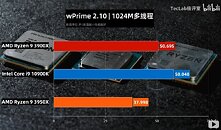
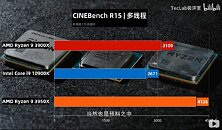
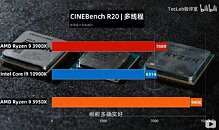
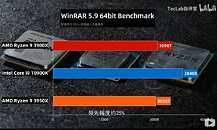
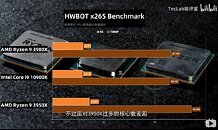
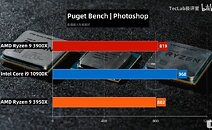
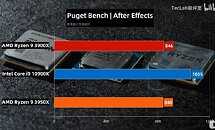
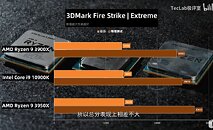
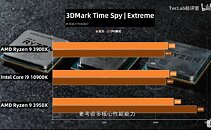
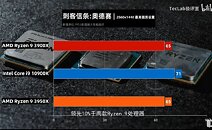
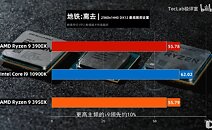


159 Comments on Comprehensive Core i9-10900K Review Leaked: Suggests Intel Option Formidable
May be different when some proper reviews are done...but we were warned by the M/board makers the 10900k was a 'hot' chip.Yeah...With a 337w power draw. It's smoking alright.
The test uses the whole system power consumption.
3900x machine: idle 126W , Full CPU load: 263W
10900k machine: idle 107W , Full CPU load: 338W
3950x machine: idle 128W , Full CPU load: 306W
From my own experience, Ryzen idles ~30-ish W , Intel idles ~20
For a rough guess, let's take 90W out from the idle power consumption.
So for CPU only:
3900x: 173W
10900k: 248W
3950x : 216W
10900k is 43.35% more power hungry than 3900x.
Zen 3 will lose in the future, that is correct. But till Intel comes out with a 7nm, 5nm or even 3nm processor, they will still be the underdog with no product to compete. And also, its not like Zen 3 is the last product that AMD is releasing and they will not wait around for Intel to respond. Perhaps if you have some insights as to when Intel's 5nm will be out since you mentioned AMD will lose sooner than we know? I know you sound like you are defending for Intel, but your defense is full of loopholes and unreasonable.
I mean if you play on low settings on 1080p or below, basically if are a "pro" high fps player in CSGO sure go intel.
But if you are a more mainstream? or average gamer, they tend to prefere high resolutions and all the settings cranked, meaning you wont benefit from that Intel cpu at all, you would just be buying an aged cpu in a new suit.
Put this beast into a system with a RTX2080,overclock it and you'll get what >500W peak gaming draw? To cope <>750W would be more sensible.
750W psu for a 500W load is paying too much for no reason. 650W is plenty for that.
I guarantee you will get within 25-50MHz boost clocks (so performance will be between 0.5% and 1% lower) on the 3900X using a more normal motherboard that delivers 142W PPT and my experience of the 3950X is that it's maybe 10% hungrier, give or take, so it will be a fraction slower at 142W but it will still definitely meet the rated clockspeeds, even when using the 3900X's stock cooler (though it's damn noisy when trying to handle a 3950X!)
Although PBO+ is a 'stock feature', the AMD spec for a 105W CPU is 142W - meaning that both the 3900X and 3950X are capable of meeting their rated clocks at 142W or lower.
PBO+ on high-end motherboards qualifies as a factory overclock that goes beyond AMD's stock settings. It is massively inefficient and guzzles tons of extra power for very little extra performance. Nobody is going to buy a $300 overclocking board and use cheap air cooling so that's fine - but it needs to be taken into consideration when comparing "stock" performance/Watt figures because overclocking-focused boards will automatically overclock the CPU through PBO+ to well beyond the sweet spot on the efficiency curve. As someone building rendering nodes that are running 24/7 all-core loads, the efficiency curve matters a lot to me.A 650W PSU for a 500W load is fine, but remember that PSU efficiency is highest at around 50% load.
A 650W PSU will certainly do the job for the warranty period but it'll run hotter and louder and is less likely to last as long past the warranty period. The biggest thing that degrades PSU components is heat, and the best way to keep a PSU cool is to operate well below its peak load and in its most efficient operation range.
20% increase in IPC and some 200MHz in clock speeds for budget chips would be plenty, dont be greedy in your predictions. The top end of the clock speed spectrum won’t likely get that much more anyway due to the exponential relationship with power consumption and clocks. So base clocks get maybe 200-300MHz boost and the top end possibly 100MHz.
The top products will be fast af and cost an arm and a leg as there is no competition. Budget chips like 4600 will be truly awesome though in all aspects.
That advice only serves to spend more money for no/little tangible reasons. Buying a PSU to run it at 50% load is a monumental waste of cash. 60-75% is a great sweetspot between price, headroom, and quiet operations.
EDIT: I just ran a game (Forza 4) with a 'CPU' @ 5.2 GHz 10c/20t with a stock RTX 2070... want to know what the kill-a-watt said? I peaked at 301W (at the wall) during the benchmark.
EDIT2: The Division 2 - 362W peak (ran around 325W).
EDIT3: AIDA64 stress test... 290W.
EDIT4: A64 stress test + Furmark, 460W.
Again, all values are at the wall, so take away 10% for efficiency. :)
So, I stand firmly behind the 650W will be plenty fine. Truth be told, 550W would be too...though 80% is pushing things a bit for quiet operations (depends on the unit and what you have in your case). Id also run a 2080Ti on a 650W PSU without a bit of worry. Doesn't get much more than that.....
And also his figures are measured from the PSU, not from the motherboard sensors, so there are variances.
I use 3900x as well
In Prime95 small FFT it draws around ~135W package power, measured in HWinfo64
That's why I said it was just a rough guess.
Its worded that way for a reason I will leave it to you guys to assume that reason.I would prefer the 750 psu for 500w because psu's get less efficient the more you load them. And produce higher fan noise closer to max load.
The 250 Watts of room that the 750 will give you should equal a longer lasting quieter psu. And should be worth the price difference.
Both units will age but i would put my money on a decent higher wattage PSU holding out longer than a technically superior product loaded close to it's maximum.
Like I said, the 650W would be fine, the 750W would be better. Better is rarely cheaper too.
2. The 750W is in no tangible way better in this case. It is simply spending more than you need to...many would say a waste.
Only highend PSU's with come with a 7-10 year warranty and Japanese caps not the cheap stuff.
If the difference in price is $20-$30 I think its worth spending it.
If there is a $20-$30 difference, there is no way I would buy 750W over 650W in this case. None. That is $20-$30 wasted and never recovered.
Gentlemen......move on. Our points have been made. If you choose to spend more for little to no reason, that is on you/whoever is doing it. Im just here to say the reasons mentioned to go higher are soft at best. I've lived this life and have had zero issues over the last 2 decades. I've used 3 PSUs in that time. lol
There are 3 components I never go cheap with in a build.
Motherboard
PSU
Monitor
I've been building pc's for about 25 years now there is nothing you can post that will change my opinion on this.
Everyones budget will be different but my recommendation stays the same, if you can afford to spend alittle bit extra do it.
You really aren't getting more out of the device spending more. You can parade around all you want that it can run warmer, but I'm only looking for PSUs to live past their warranty. How far is always a crapshoot. I could save that $20-$30 and put it towards another PSU several years down the road. Who the hell looks at a PSU well past their warranty and thinks... if I would have bought 100W more it would still be living? Come on........
I also didn't say to go cheap either. I'm saying to buy quality units that are appropriately sized and include enough headroom for additions and quiet operation. In this case, 650W is plenty. Look at the numbers I listed... that is actual from the wall (again 10% high due to PSU).
I know for decades my method has worked flawlessly personally and for the hundreds I've helped over that time in forums. People put WAY too much stock into 50% efficiency BS. Just because I can afford $20-$30 more, doesn't mean it should be done (again, no tangible returns in this case).
Again, let's move on. The information is there, people can choose to do whatever they want.
For this Intel generation, what I am afraid the most is the pricing. They cannot price the 10900k more than $500. Just too high for what it offers relative to the competition